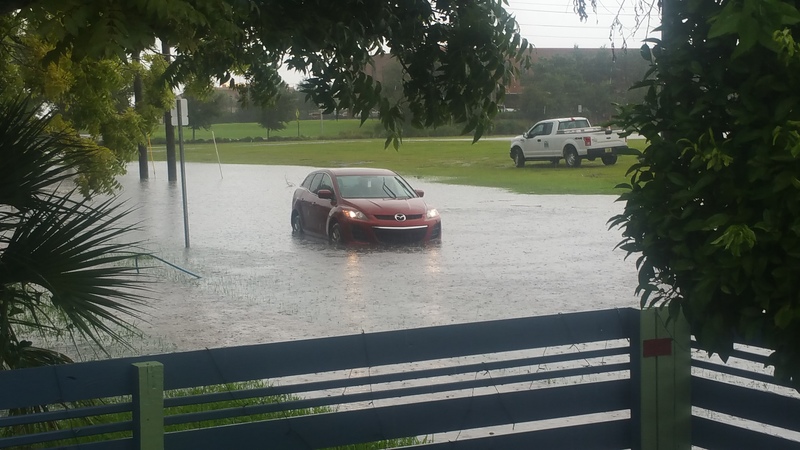A version of this story by @stevie is published in Public Lab's Community Science Forum, Issue 15. Photos courtesy of Dr. Gloria Horning.
After several iterations of stormwater projects in the New Orleans area, exploring monitoring tools and strategies, and the challenges with sharing out about localized flooding events, I was surprised to hear about the remarkable parallels happening with stormwater in Pensacola, Florida. Earlier this year, a mapping project in the Indian Bayou area highlighted the problems Pensacola Bay has with stormwater runoff from new roadway development, and friends at the Pensacola NAACP started talking to me about the stormwater flooding and wastewater contamination issues in the communities.
Dr. Gloria Horning came to Pensacola more than eight years ago as an AmeriCorps volunteer following the BP oil disaster. She has worked with disenfranchised communities in CERT (Community Emergency Response Teams) training and has come to know, firsthand, the impacts of development, and subsequent flooding in her local community. "A quick glance into the stormwater problems of the recent past, is in the influx of building and housing construction, and the lack of construction of infrastructure. We have constant flooding in several areas, especially in downtown," says Gloria. "I live here, my house is impacted by it. We can have a ten minute rain event and my street will flood."
Early last summer, Gloria and a small group of concerned residents started down a new path to thinking about what a stormwater project in Pensacola could look like. Exploring the range of issues locally, researching past and ongoing projects, and thinking about outcomes they wanted to see, the group identified a main goal: raising awareness about stormwater issues in Pensacola and what people can do about them.
Runoff problems in Pensacola run the environmental gamut, especially in the historic Tanyard neighborhood, once home to the original port. It was also the site of a sewage treatment plant that was recently moved, but the transition has not been fully completed. The existing stormwater infrastructure runs alongside the sewage pipes; often when there's a problem with either system, both are affected. The result is raw sewage ending up in the stormwater, flooding the community, and spilling into the bay. A recent rain event sent 44,000 gallons of raw sewage into the neighborhood, littering lawns with toilet paper and feminine hygiene products that were never cleaned up.
New development has further exacerbated the problem; the creeks running through the neighborhood and uptown have been filled in, paved over, and built on. Last summer, the city, expecting more housing development, resurfaced the roads, putting pavement on top of pavement. Not only did they not level the new pavement down to the existing storm drains, they also failed to do a pressure test on the road. The added pressure from the new paving burst the sewage pipe that ran underneath it, which had been put in by the Emerald Coast Utility Authority (ECUA) just one year before. From this event alone, 10,000 gallons of raw sewage flooded the neighborhood and a newly finished park, before draining into the bay.
The oversight of Pensacola infrastructure is split between governing bodies. The ECUA manages the sewage system, the county oversees the stormwater system, and the city manages development. Gloria remarks that the distributed management leads to "a lot of finger pointing."
The project that the NAACP and other partners scoped earlier this summer involves a campaign for how to clean storm drains, report flooding events, and educate on the sources of stormwater pollution. "I believe it is up to the citizens to understand what's going on, and to take action. We need to get more people involved---to go and clean the stormwater drains, to attend meetings, and to speak up," says Gloria.
Gloria is now running for the Emerald Coast Utility Authority board to represent her neighborhood in Pensacola. While her campaign goals include opening direct communication between ECUA and the public, and building partnerships with the city and county to promote best practices, she's also working on the front lines of the stormwater issue with the people in her community. She believes that when people see the storm drains as part of a larger system that helps to keep them from flooding, they can work to clean them and advocate for their maintenance. "I've seen it in other communities, and people seem to get it. It's small, but non-confrontational education." She sees this issue is part of something bigger, saying, "You have to look that the science of climate change, and the impact it's having. It's a marathon to fight this problem. It's important, it's awareness, it's education, and a willingness to change a little bit from what we've always been doing." _
_

Dr. Gloria Horning, a community activist in Pensacola, is running for a position on her local utility board to help support her residents in her city. Even minor rainfall events are enough to flood neighborhoods in Pensacola, sending raw sewage into the community and out into the bay. 


1 Comments
@joyofsoy has marked @stevie as a co-author.
Reply to this comment...
Log in to comment
Login to comment.